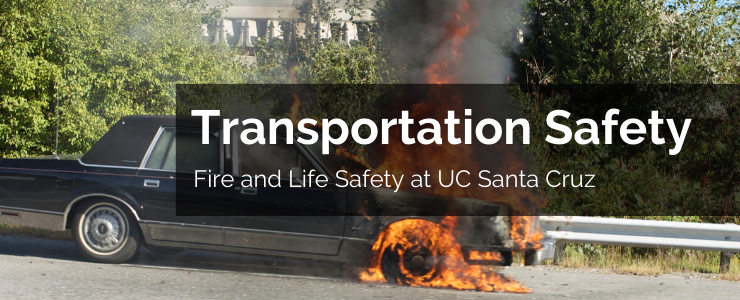Transportation Safety
Our lives are built on systems of transportation that ensure we get where we need to go when we need to be there. At the moment, most of our mediums for transportation place us in close proximity to ignitable fuels and other dangerous conditions. This section aims to provide you with clear resources on how to mitigate, prevent, and respond to dangerous situations while using transportation.
Cars
Cars are comprised of many flammable fluids that can pose a serious danger when a car is damaged through a crash, misrepair, or significant wear. Most commonly, mechanical or electrical issues are the most common cause for car fires. It is also possible (but not common) for crashes to cause a car fire. regardless, if you smell burning rubber or plastic, take immediate action.
Preventing a Fire:
- Have your car services regularly by a professional mechanic.
- If transporting flammable liquids, keep them in sealed containers and try to keep the amount small.
- Do not park where flammable materials (grass, brush, etc) are touching the catalytic converter.
- Drive safely and avoid taking unnecessary risks.
Check for Warning Signs:
- Cracked or loose wiring.
- Electrical problems or malfunctions.
- Oil or fluid leaks.
- Oil cap not on securely.
- Rapid changes in fuel/fluid level, or engine temperature.
What to Do During a Car Fire:
- Immediately pull over where it is safe to do so, use your signal to get to a breakdown lane or rest stop.
- Turn off the engine once you have stopped.
- Get everyone out of the car immediately.
- Move to a distance of at least 100 feet away from the burning car and well out of the way of traffic.
- Call 9-1-1.
More Information
Motor Homes, Campers, and Recreational Vehicles
These types of vehicles often serve a dual purpose of both transportation and living. You may find detailed information about various safety processes in other sections of this Fire and Life Safety area of the website. This section will provide some general RV-specific safety guidelines.
In RVs, fires can start from an abundance of areas. It is important to consider that this vehicle has the same vulnerabilities as a car while also having vulnerabilities related to kitchen, laundry, and appliances depending on your RV's configuration.
- Install and test smoke detectors.
- If you are using gas-fed appliances, install and test Carbon Monoxide detectors.
- Only plug-in one heat-producing appliance at a time.
- Keep a gas leak detector on board and use it to check for leaks in your appliances (refrigerator, furnace, oven, stovetop).
- Have your propane system inspected regularly to make sure it still works properly.
- Ensure that there are two ways out of every area in your RV, make sure that the windows open properly and easily.
- Have everyone living in the RV practice an escape plan.
- Do not keep camping heaters and lanterns on while sleeping.
- Make sure that your RV is serviced by a qualified mechanic.
- Keep a portable fire extinguisher onboard for small fires that can be contained.
More Information
NFPA Recreational Vehicles (PDF)

